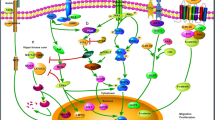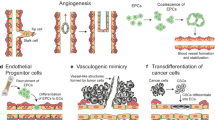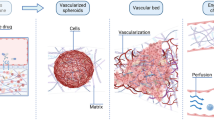Abstract
Cancer metastasis is a highly complex process that involves aberrations in gene expression by cancer cells leading to transformation, growth, angiogenesis, invasion, dissemination, survival in the circulation, and subsequent attachment and growth in the organ of metastasis. Angiogenesis facilitates metastasis formation by providing a mechanism to (1) increase the likelihood of tumor cells entering the blood circulation and (2) provide nutrients and oxygen for growth at the metastatic site. The formation and establishment of metastatic lesions depend on the activation of multiple angiogenic pathways at both primary and metastatic sites. A variety of factors involved in the angiogenesis of liver metastasis have been identified and may serve as prognostic markers and targets for therapy. Vascular endothelial growth factor, interleukin-8, and platelet-derived endothelial cell growth factor are all proangiogenic factors that have been associated with liver metastasis from various primary tumor types. Inhibition of the activity of these factors is a promising therapeutic approach for patients with liver metastases. In addition, inhibition of integrins that mediate endothelial cell survival may also serve as a component of therapeutic regimens for liver metastases. This review focuses on the biology of angiogenesis in liver metastasis formation and growth. Because colorectal carcinoma is the most tumor to metastasize to the liver, this disease will serve as a paradigm for the study of angiogenesis in liver metastases.
Similar content being viewed by others
References
Folkman J. What is the evidence that tumors are angiogenesis dependent?.J Natl Cancer Inst 1990;82:4–6.
Fidler IJ, Ellis LM. The implications of angiogenesis for the biology and therapy of cancer metastasis.Cell 1994;79:185–8.
Fidler IJ. Critical factors in the biology of human cancer metastasis: twenty-eight G.H.A. Clowes memorial award lecture.Cancer Res 1990;50:6130–8.
Bouck N. Tumor angiogenesis: the role of oncogenes and tumor suppressor genes.Cancer Cells 1990;2:179–85.
Kerbel RS. Growth dominance of the metastatic cancer cell: cellular and molecular aspects.Adv Cancer Res 1990;55:87–132.
Holash J, Maisonpierre PC, Compton D, et al. Vessel cooption, regression, and growth in tumors mediated by angiopoietins and VEGH.Science 1999;284:1994–8.
Fidler IJ. Modulation of the organ microenvironment for treatment of cancer metastasis.J Interferon Cytokine Res 1995;15:585–92.
Jung YD, Ahmad SA, Akagi Y, et al. Role of the tumor microenvironment in mediating response to anti-angiogenic therapy.Cancer Metastasis Rev 2000;19:147–57.
Radinsky R, Ellis LM. Molecular determinants in the biology of liver metastasis.Surg Oncol Clin N Am 1996;5:215–29.
Terayama N, Terada T, Nakamura Y. An immunohistochemical study of tumour vessels in metastatic liver cancers and the surrounding liver tissue.Histopathology 1996;29:37–43.
Terayama N, Terada T, Nakanuma Y. Histologic growth patterns of metastatic carcinomas of the liver.Jpn J Clin Oncol 1996;26: 24–9.
Paku S, Lapis K. Morphological aspects of angiogenesis in experimental liver metastases.Am J Pathol 1993;143:926–36.
Gervaz P, Scholl B, Mainguene C, Poitry S, Gillet M, Wexner S. Angiogenesis of liver metastases: role of sinusoidal endothelial cells.Dis Colon Rectum 2000;43:980–6.
Warren RS, Yuan H, Matli MR, Gillett NA, Ferrara N. Regulation by vascular endothelial growth factor of human colon cancer tumorigenesis in a mouse model of experimental liver metastasis.J Clin Invest 1995;95:1789–97.
Tischer E, Mitchell R, Hartman T, et al. The human gene for vascular endothelial growth factor. Multiple protein forms are encoded through alternative exon splicing.J Biol Chem 1991;266: 11947–54.
Tokunaga T, Oshika Y, Abe Y, et al. Vascular endothelial growth factor (VEGF) mRNA isoform expression patterns is correlated with liver metastasis and poor prognosis in colon cancer.Br J Cancer 1998;77:998–1002.
Takahashi Y, Kitadai Y, Bucana CD, Cleary KR, Ellis LM. Expression of vascular endothelial growth factor and its receptor, KDR, correlates with vascularity, metastasis, and proliferation of human colon cancer.Cancer Res 1995;55:3964–8.
Etoh T, Shibuta K, Barnard GF, Kitano S, Mori M. Angiogenin expression in human colorectal cancer: the role of focal macrophage infiltration.Clin Cancer Res 2000;6:3545–51.
Adachi Y, Itoh F, Yamamoto H, et al. Expression of angiomodulin (tumor-derived adhesion factor/mac 25) in invading tumor cells correlates with poor prognosis in human colorectal cancer.Int J Cancer 2001;95:216–22.
Kawakami T, Tokunaga T, Hatanaka H, et al. Interleukin 10 expression is correlated with thrombospondin expression and decreased vascular involvement in colon cancer.Int J Oncol 2001; 18:487–91.
Takahashi Y, Bucana CD, Liu W, Yoneda J, Cleary KR, Ellis LM. Platelet-derived endothelial cell growth factor in human colon cancer angiogenesis: role of infiltrating cells.J Natl Cancer Inst 1996;88:1146–51.
Maeda K, Nishiguchi Y, Kang SM, et al. Expression of thrombospondin-1 inversely correlated with tumor vascularity and hematogenous metastasis in colon cancer.Oncol Rep 2001;8:763–6.
Nakata S, Ito K, Fujimori M, et al. Involvement of vascular endothelial growth factor and urokinase-type plasminogen activator receptor in microvessel invasion in human colorectal cancers.Int J Cancer 1998;79:179–86.
Werther K, Christensen IJ, Brunner N, Nielsen HJ. Soluble vascular endothelial growth factor levels in patients with primary colorectal carcinoma. The Danish RANX05 Colorectal Cancer Study Group.Eur J Surg Oncol 2000;26:657–62.
Cascinu S, Staccioli MP, Gasparini G, et al. Expression of vascular endothelial growth factor can predict event-free survival in stage II colon cancer.Clin Cancer Res 2000;6:2803–7.
Lee JC, Chow NH, Wang ST, Huang SM. Prognostic value of vascular endothelial growth factor expression in colorectal cancer patients.Eur J Cancer 2000;36:748–53.
Takahashi Y, Tucker SL, Kitadai Y, et al. Vessel counts and expression of vascular endothelial growth factor as prognostic factors in node-negative colon cancer.Arch Surg 1997;132:541–6.
Matsushima K, Baldwin ET, Mukaida N. Interleukin-8 and MCAF: novel leukocyte recruitment and activating cytokines.Chem Immunol. 1992;51:1236–65.
Shi Q, Abbruzzese JL, Huang S, Fidler IJ, Xiong Q, Xie K. Constitutive and inducible interleukin 8 expression by hypoxia and acidosis renders human pancreatic cancer cells more tumorigenic and metastatic.Clin Cancer Res 1999;5:3711–21.
Li A, Varney ML, Singh RK. Expression of interleukin 8 and its receptors in human colon carcinoma cells with different metastatic potentials.Clin Cancer Res 2001;7:3298–304.
Ueda T, Shimada E, Urakawa T. Serum levels of cytokines in patients with colorectal cancer: possible involvement of interleukin-6 and interleukin-8 in hematogenous metastasis.J Gastroenterol 1994;29:423–9.
Kitadai Y, Ellis LM, Takahashi Y, et al. Multiparametric in situ messenger RNA hybridization analysis to detect metastasis-related genes in surgical specimens of human colon carcinomas.Clin Cancer Res 1995;1:1095–102.
Ura H, Denno H, Hirata K, Yamaguchi K, Yasoshima T. Separate functions of alpha2beta1 and alpha3beta1 integrins in the metastatic process of human gastric carcinoma.Surg Today 1998;28: 1001–6.
Yun Z, Menter DG, Nicolson GL. Involvement of intergrin alphavbeta3 in cell adhesion motility, and liver metastasis of murine RAW117 large cell lymphoma.Cancer Res 1996:56:3103–11.
Stoeltzing O, Liu W, Reinmuth N, et al. Reduction of colon cancer growth by a novel antiangiogenic agent that targets the integrin 51 (abstract).Clin Cancer Res 2001;7 (Suppl):A17:4.
Reinmuth N, Liu W, Ahmad SA, et al. The (v)-(3) inhibitor S247 decreases colon cancer metastasis, angiogenesis and improves survival in a murine model of liver metastasis (abstract).Clin Cancer Res 2001;7(Suppl):A24:5.
Ishikawa F, Miyazono K, Hellman U, et al. Identification of angiogenic activity and the cloning and expression of platelet-derived endothelial cell growth factor.Nature 1989;338:557–62.
Moghaddam A, Zhang HT, Fan TP, et al. Thymidine phosphorylase is angiogenic and promotes tumor growth.Proc Natl Acad Sci U S A 1995;92:998–1002.
Maeda K, Chung YS, Ogawa Y, et al. Thymidine phosphorylase/platelet-derived endothelial cell growth factor expression associated with hepatic metastasis in gastric carcinoma.Br J Cancer 1996;73:884–8.
Takahashi Y, Bucana CD, Akagi Y, et al. Significance of platelet-derived endothelial cell growth factor in the angiogenesis of human gastric cancer.Clinl Cancer Res 1998;4:429–34.
Takao S, Akiyama SI, Nakajo A, et al. Suppression of metastasis by thymidine phosphorylase inhibitor.Cancer Res 2000;60: 5345–8.
Baenziger NL, Brodie GN, Majerus PW. Isolation and properties of a thrombin-sensitive protein of human platelets.J Biol Chem 1972;247:2723–31.
Zabrenetzky V, Harris CC, Steeg PS, Roberts DD. Expression of the extracellular matrix molecule thrombospondin inversely correlates with malignant progression in melanoma, lung and breast carcinoma cell lines.Int J Cancer 1994;59:191–5.
Tokunaga T, Nakamura M, Oshika Y, et al. Thrombospondin 2 expression is correlated with inhibition of angiogenesis and metastasis of colon cancer.Br J Cancer 1999;79:354–9.
Shaheen RM, Davis DW, Liu W, et al. Antiangiogenic therapy targeting the tyrosine kinase receptor for vascular endothelial growth factor receptor inhibits the growth of colon cancer liver metastasis and induces tumor and endothelial cell apoptosis.Cancer Res 1999;59:5412–6.
Shaheen RM, Tseng WW, Vellagas R, et al. Effects of an antibody to vascular endothelial growth factor receptor-2 on survival, tumor vascularity, and apoptosis in a murine model of colon carcinomatosis.Int J Oncol 2001;18:221–6.
Shaheen RM, Tseng WW, Davis DW, et al. Tyrosine kinase inhibition of multiple angiogenic growth factor receptors improves survival in mice bearing colon cancer liver metastases by inhibition of endothelial cell survival mechanisms.Cancer Res 2001;61: 1464–8.
Bruns CJ, Liu W, Davis DW, et al. Vascular endothelial growth factor is an in vivo survival factor for tumor endothelium in a murine model of colorectal carcinoma liver metastases.Cancer 2000;89:488–99.
Author information
Authors and Affiliations
Corresponding author
Rights and permissions
About this article
Cite this article
Takeda, A., Stoeltzing, O., Ahmad, S.A. et al. Role of angiogenesis in the development and growth of liver metastasis. Annals of Surgical Oncology 9, 610–616 (2002). https://doi.org/10.1007/BF02574475
Received:
Accepted:
Issue Date:
DOI: https://doi.org/10.1007/BF02574475




